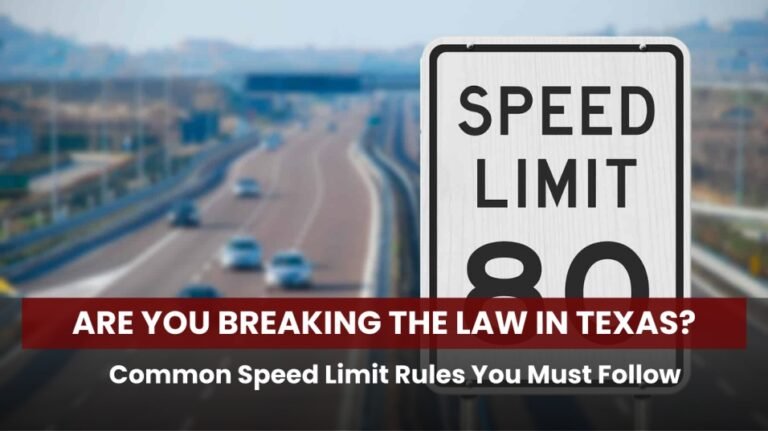The wide highways, open country roads, and long stretches of interstate highways can make driving in Texas seem like an adventure. Often, even the most careful drivers may feel tempted to press a little harder on the gas pedal. But I wouldn’t dare take the risk, as Texas also has some of the strictest and strangest speed limit rules in the United States. Understanding these laws will not only keep you safe but also help you avoid costly tickets, points on your license, and even higher insurance premiums.
So, let’s dive into the essentials: what Texas speed limits really mean, how they’re enforced, and the common mistakes drivers make.
Why Texas Speed Limit Rules Matter
It’s easy to think of speed limits as suggestions, but in Texas, speed limit rules are a legal requirement. The Texas Department of Transportation (TxDOT) sets speed limits to ensure safety along with smoothly flowing traffic. Factors like road type, traffic density, and accident history all play a role in determining these speed limits.
When you ignore these limits, you don’t just risk getting a ticket. That is the least destructive part of speeding. It’s the possibility of accidents and fatalities that is the most dangerous. According to TxDOT’s 2023 crash data, speeding contributed to nearly one out of every four traffic fatalities in the state. That means when you speed, you’re not only breaking the law but also putting yourself and others in real danger.
Legal Speed Limits in Texas
While basic speed rules according to Texas law always take priority, these are the Texas speed limits you can generally expect across different types of roads in Texas.
- Highways and Interstates
Texas speed limits usually range from 70 to 75 mph, but some rural stretches allow up to 80 or even 85 mph, the highest in the nation. The speed limits are set based on whether the highway is capable of withstanding such speeds and if such speeds have been determined safe by a traffic and engineering study.
- Urban Areas & Residential Streets
In city zones, business areas, and residential streets, you’ll typically see speed limits up to 30 mph.
- Rural Areas
On the rural highways of Texas, speed limits are usually set between 55 to 75 mph. The speed limits could change based on the weather and road conditions, so always check the signs before speeding up.
- School Zones
Speeding laws in Texas school zones almost always require you to reduce speeds between 15 to 30 mph during school hours, with flashing lights or signs to remind you. Disregarding signs and speed limits can lead to fines.
- Construction Zones
You will also find temporary speed limits posted in construction zones, which are often lower than the usual limits. Speeding fines in these areas can double if workers are present.
The Famous 85 MPH Maximum Speed Limit On Texas Highways
If you’re wondering where in Texas you are permitted to drive at 85 legally, it’s on State Highway 130 near Austin and San Antonio. The 85 mph speed limit is the fastest posted by any state in the U.S.
But here’s the catch: just because you can drive that fast doesn’t mean you should. Weather, traffic, and your car’s condition all affect safety. Law enforcement officers can still cite you for driving too fast for conditions, even if you’re under the posted limit.
“Prima Facie” Speed Law in Texas
Here’s something many drivers overlook in Texas. Texas follows the prima facie speed law. This means the posted speed limits are considered the maximum safe speeds under normal conditions. If you’re going too fast for rain, fog, heavy traffic, or poor road conditions, even if you’re below the posted limit, you can still be ticketed.
For example:
- Driving 60 mph in a 70 mph zone during a heavy thunderstorm could still count as speeding because conditions make that speed unsafe.
- Likewise, driving too slowly by Texas laws on a highway (below the minimum speed) can also be a violation if it disrupts traffic flow.
“Move Over” Law in Texas & Penalties
The “move over or slow down” Texas law requires you to move to the next lane or slow down when you approach an emergency or Texas Department of Transportation (TxDOT) vehicle that has its lights on at the side of the road. Violating this law can lead to hefty fines of up to $1,250.
Posted Vs Safe Speeds in Texas
In Texas, the posted speed limit is the maximum speed you’re legally allowed to drive under normal conditions. But the safe speed can be lower depending on weather, traffic, or road conditions. Thanks to the state’s prima facie speed law discussed above, you can still get a ticket for driving “too fast for conditions” even if you’re under the posted limit. For instance, going 60 mph in heavy rain on a 70 mph road can result in a fine if it is considered an unsafe speed for the road conditions.
Texas Fines For Speeding
So what happens if you exceed speed limits in Texas? Penalties can vary depending on how far over the limit you were going, where the violation occurred, and your driving record.
- Base Fines: Typically range from $150 to $300 for minor offenses.
- Construction or School Zones: Expect higher fines, often doubled.
- Excessive Speeding: Going 25 mph or more above the limit can sometimes lead to reckless driving charges, which carry heavier consequences.
- Driver Record Points: Convictions for speeding can add points to your driving record, which can raise your insurance rates and even result in license suspension if you accumulate too many.
Sample Fines Levied By Bexar County, Texas
- $190 for speed limits exceeding 1 – 10 mph
- $215 for speed limits exceeding 11 – 15 mph
- $240 for speed limits exceeding 16 – 20 mph
- $265 for speed limits exceeding 21 – 25 mph
Common Mistakes Drivers Make in Texas
- Assuming all highways are 75 mph. Some are 70, some are 80, and others have sudden drops near city limits. Follow the speed signs posted on the roads to stay out of trouble.
- Ignoring school zone signs. Flashing lights mean slow down. Texas law enforcement takes this very seriously, and failing to reduce speeds could result in a hefty fine.
- Speeding through small towns. Many rural towns in Texas use speed limits as both safety measures and revenue sources. Limits often drop suddenly as you enter, so look out for road signs that tell you the speed limits
- Not adjusting for weather. Remember the prima facie law I discussed earlier. You can’t drive “as if it’s sunny” when it’s raining in Texas.
- Cruise control on hilly or winding roads. It’s easy to unintentionally speed in these conditions. Use your car’s cruise control feature to maintain a constant speed and keep from overspeeding
Frequently Asked Questions (FAQs)
The highest posted speed limit is 85 mph on State Highway 130, a toll road near Austin and San Antonio.
Yes. Driving unreasonably slowly, especially on highways, can disrupt traffic and result in a citation.
Yes. A speeding conviction typically increases insurance premiums, sometimes significantly, depending on your driving history.
Absolutely. Fines often double in these areas, particularly if workers or children are present.
Yes, you can contest a ticket in court. In some cases, you may be able to reduce penalties or dismiss the ticket by taking a defensive driving course.
Excessive speeding (25+ mph over the limit) may result in a reckless driving charge, which carries heavier fines, possible jail time, and long-term consequences on your driving record.
Texas bans red-light cameras, but police still rely heavily on radar and laser devices for speed enforcement.
Typically, a speeding violation remains on your record for three years, which can affect both your insurance and your ability to take defensive driving for future tickets.
In Conclusion
You may find Texas roads long and inviting, but staying within the speed limit is essential for your safety and your pocket. Apart from avoiding tickets, remember you are also protecting lives. By understanding standard speed limits in Texas, respecting special zones, and adjusting for conditions, you’ll be a safer, more responsible driver.
For the latest information, the Texas Department of Transportation is an excellent resource to review before your next road trip.
Want more driving tips, car insights, and guidance on navigating road laws across the U.S.? Head over to Ask About Cars for expert advice before your next trip.






